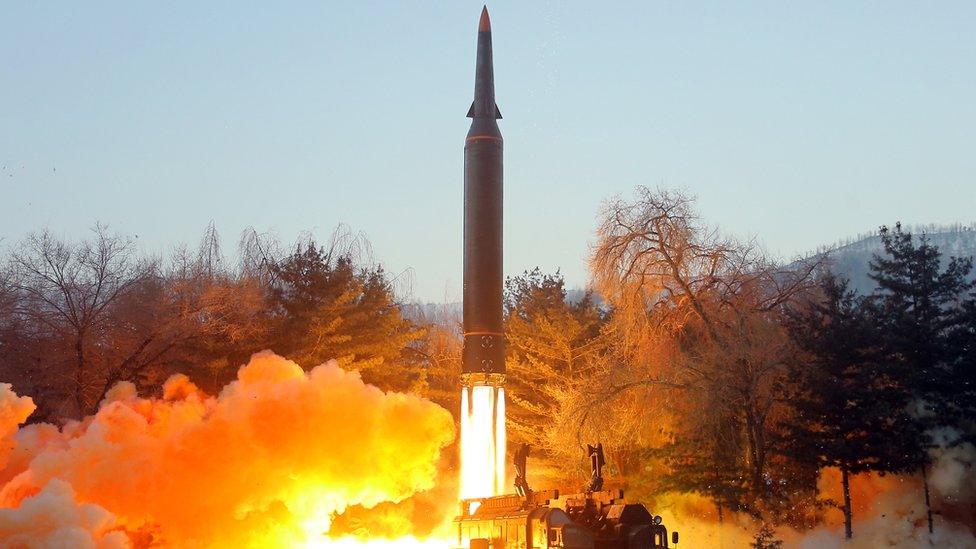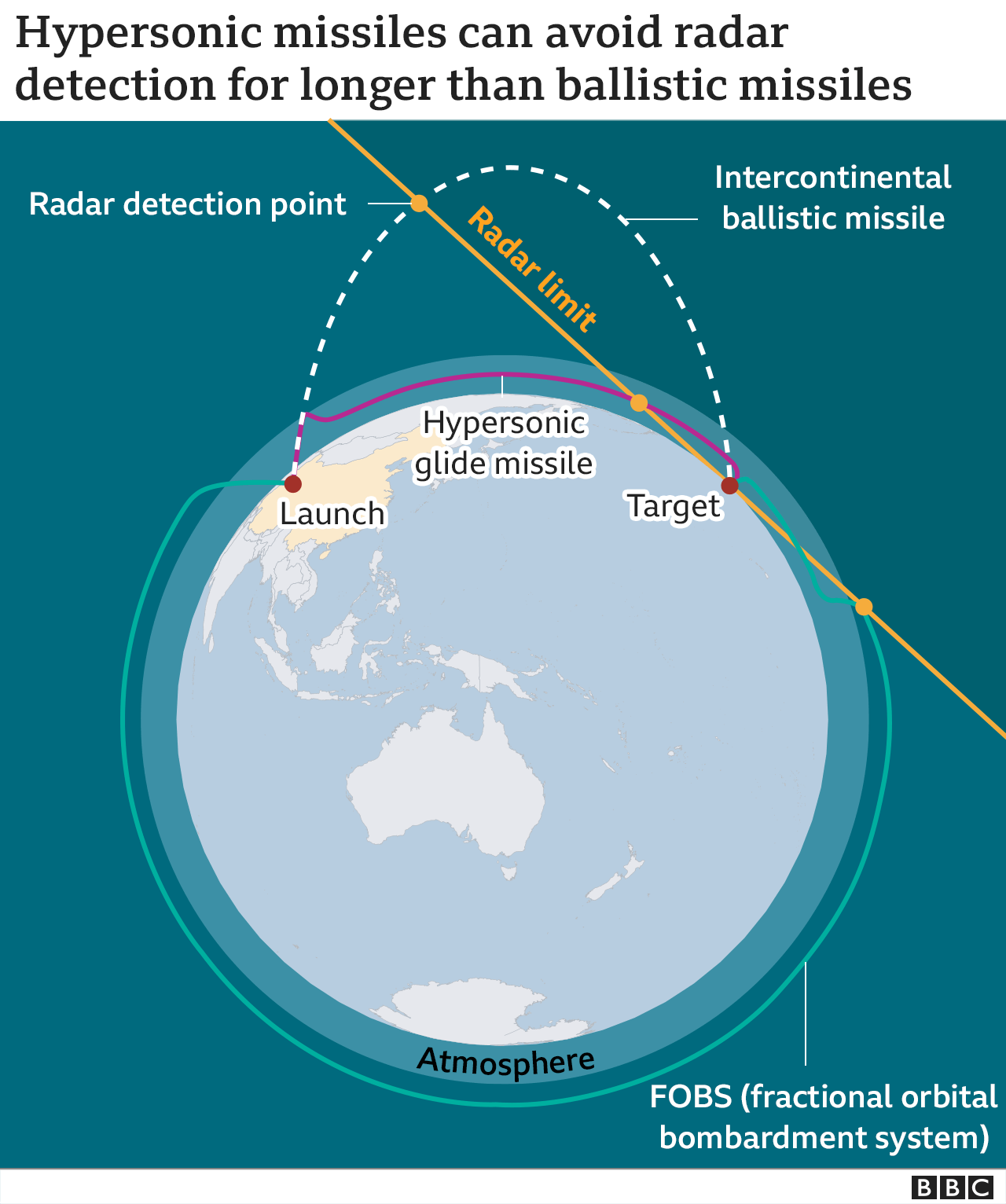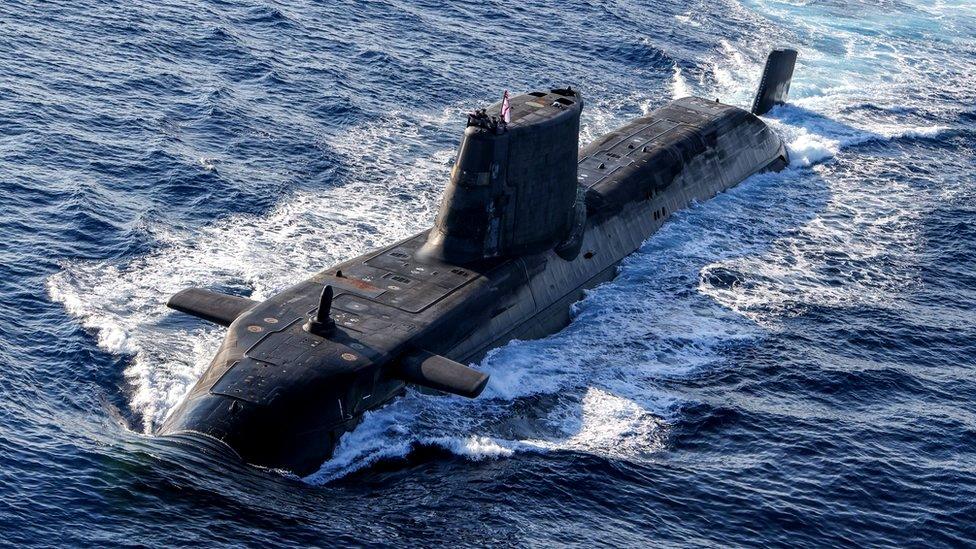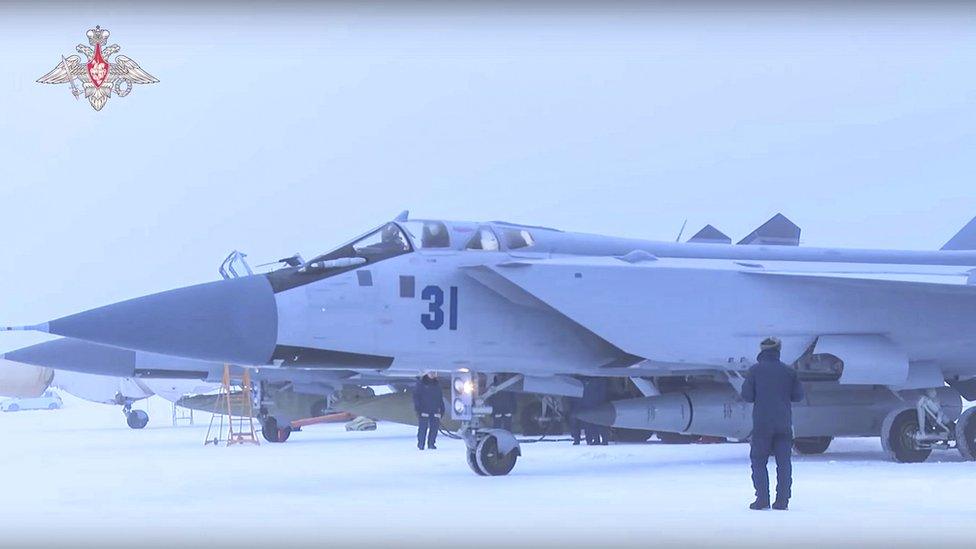Hypersonic missiles: UK, US, and Australia to boost defence co-operation
- Published

The UK, US, and Australia will begin co-operating on research into hypersonic weapons and how to defend against them, the government has said.
The programme will be part of the AUKUS partnership, a security pact announced by the three countries last year.
It follows the development of hypersonic missiles by China and Russia and their purported use by Russia in Ukraine last month.
Hypersonic weapons are those that exceed five times the speed of sound.
They are harder to defend against because of their speed as well as the fact they fly at low altitudes - beyond the line of sight of ground-based radars - and can manoeuvre mid-flight.
The UK does not currently possess hypersonic missiles.
The US and Australia have an existing joint programme to develop the weapons but the UK government stressed the focus of the new venture would be on defence.
It said there were no plans for the UK to develop its own hypersonic weapons but the new programme would help it assess whether it would need to develop them in future.
It added the latest announcement was not related to Russia's use of the weapons in Ukraine but said the fact other nations were investing in them meant the UK had to think about how to defend against them.
On 19 March, Russia claimed to have used a hypersonic missile to destroy an arms depot in western Ukraine, and US military intelligence has suggested Russian forces have used them repeatedly since.
The attacks would mark the first use of hypersonic missiles in combat.

It came just months after China caught US intelligence by surprise when it tested two nuclear-capable hypersonic missiles.
Each circled the globe in low-orbit space before coming back down to Earth, the second missing its target by only about 24 miles (40 km).
The missile is thought to combine a so-called fractional orbital bombardment system, which sends missiles into a partial orbit of the Earth to strike from an unexpected direction, with a hypersonic glider, which remains in the outer atmosphere and is hard to detect until later into its flight.
The tests demonstrated China had far more advanced space capability than had previously been understood.
North Korea has also claimed to be in the process of testing hypersonic missiles.

A potential game-changer

Hypersonic missiles are potentially a game-changer in the way future wars will be fought.
As their name suggests, they travel at immense speed - Mach 5 or greater, which equates to around a mile a second. They are what is called "dual capable" meaning they can carry either a conventional explosive or nuclear warhead. They can also be launched from either air, sea or land.
There are two types of these weapon: cruise missiles and glide vehicles. The cruise variant, of which Russia has several, can be launched from an aircraft and hit a target more than 1,200 miles away. The glide variant is launched up into space from where it then glides down to earth on an unpredictable path.
Hypersonic missiles are changing the way nations plan for their strategic defence for two reasons. Firstly, they are so fast there would be very little time - just minutes - between a launch being detected and a country's leader having to decide whether to retaliate. There is almost no way of knowing whether that missile is nuclear-tipped or not.
Secondly, their flight path, especially that of a hypersonic glide vehicle (HGV), is so hard to predict it makes interception extremely difficult.
Currently China is in the forefront of hypersonic missile development, closely followed by Russia, which has already used them to hit long distance targets in Ukraine. The US is late to the game and some of its tests have not gone well.
Britain does not possess any and is only now forming an alliance with the US and Australia to carry out research into them and how, if possible, to defend against them.

The AUKUS partnership, announced in September 2021, is a trilateral security pact for the Indo-Pacific region. The primary purpose of the deal is for the US and UK to help Australia acquire nuclear-powered submarines.
The deal also aims to deepen co-operation on cyber capabilities, artificial intelligence, quantum technologies, and additional undersea capabilities.
Following Tuesday's announcement, the UK's national security advisor Stephen Lovegrove said: "When we bring together the technical knowledge and capabilities of our three countries, we can achieve a huge amount to help keep ourselves and our allies and partners safe.
"In light of Russia's invasion of Ukraine, it's more important now than ever that allies work together to defend democracy, international law and freedom around the world."

THE GREATEST BOXER IN HISTORY: The incredible life of Muhammad Ali...
THE BEST AT BEING BAD: Celebrating the British actors are who so good at being bad

Related topics
- Published16 September 2021

- Published19 March 2022

- Published12 January 2022
